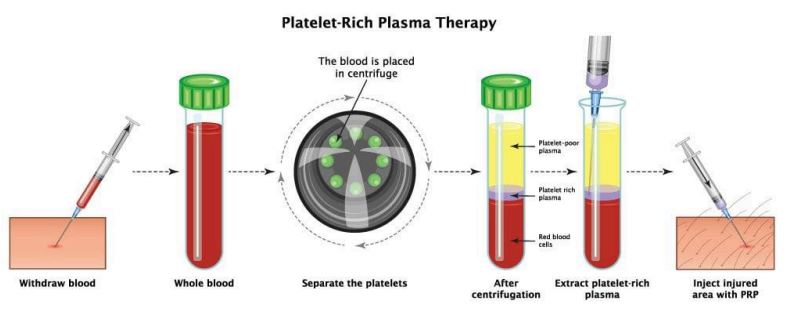Platelet-Rich Plasma (PRP) Injection
(Regenerative Treatment for Joint and Tendon Pain)
Overview
Platelet-Rich Plasma (PRP) therapy is a regenerative treatment that uses a patient’s own blood to promote healing in injured or inflamed tissues. This innovative approach is commonly used to treat orthopedic conditions such as joint pain, tendon injuries, and ligament strains.
PRP contains a high concentration of platelets, which are rich in growth factors that help reduce inflammation, repair damaged tissues, and stimulate natural healing. At Restore Spine and Pain, PRP injections are performed under ultrasound or fluoroscopic image guidance for precision and safety.

Conditions Treated
- Knee osteoarthritis
- Shoulder arthritis
- Tennis elbow (lateral epicondylitis)
- Golfer’s elbow (medial epicondylitis)
- Rotator cuff tendinopathy
- Patellar and Achilles tendinopathy
- Hip bursitis or gluteal tendinopathy
- Plantar fasciitis
What are the risks and side effects?
Risks and side effects are minimal, and serious complications are rare. We take every precaution to ensure your safety. Potential risks may include but are not limited to:
- Localized pain or swelling
- Infection (rare)
- Bruising or bleeding at the injection site
- Vasovagal reaction (fainting)
- No or limited therapeutic response
Ask your provider if you have any concerns. Your physician will review the risks in detail before the procedure to ensure you are fully informed.
Pre-Procedure Information
How Should I Prepare?
- Driver Required: We ask that you arrange for a driver to take you home after the procedure.
- Food: You may eat a light meal 1–2 hours prior to the procedure. If sedation is planned, please follow the specific sedation protocol provided by our team.
Medications:
- Continue routine medications unless directed otherwise.
-
Blood thinners, Aspirin, NSAIDs, and supplements:
- Inform us in advance if you take blood thinners (e.g., Plavix, Eliquis, Xarelto, Coumadin), NSAIDs (e.g., ibuprofen, naproxen), Aspirin, or supplements that increase bleeding risk.
- Certain medications may need to be stopped for a short period of time before the injection.
- Speak with your prescribing provider to ensure it’s safe to temporarily stop these medications.
- Our team will review your medication list and coordinate with your other providers if needed.
Notify us if:
- You have a fever, infection, or recent illness
- You have started antibiotics or had changes to your medications.
Sedation:
Most procedures can be performed comfortably without sedation. However, if you have anxiety or difficulty lying flat, mild sedation may be offered at the discretion of the physician. Please discuss this with your provider in advance.
What if I am pregnant?
There are serious potential risks to an unborn fetus from imaging used during this procedure (e.g., X-ray/fluoroscopy). If there is any chance you may be pregnant, please notify our team immediately and postpone the injection until pregnancy is ruled out.
Procedure Information
The procedure is performed using sterile technique with image guidance.
- A small amount of your blood is drawn in the office.
- The blood is processed in a centrifuge to isolate the platelet-rich plasma.
- The PRP is injected into the targeted joint or tendon using image guidance to ensure accuracy.
- The procedure typically takes 30–45 minutes from start to finish and is performed in a sterile outpatient setting.
Post-Procedure Information
- Mild soreness or swelling at the injection site is common and may last for a few days.
- Ensure you stay hydrated and drink plenty of water to help promote healing.
- Avoid strenuous activity or physical therapy for the first 48–72 hours.
- Do not use NSAIDs (e.g., ibuprofen, naproxen) or steroids following the procedure as they may reduce PRP efficacy.
- Your provider will guide you on when to resume normal activity or exercise.
Risks and Side Effects
PRP injections are generally safe, especially since they use your own blood. However, potential risks may include:
- Localized pain or swelling
- Infection (rare)
- Bruising or bleeding at the injection site
- Vasovagal reaction (fainting)
- No or limited therapeutic response
Schedule a Consultation
If you're experiencing joint or tendon pain and want a non-surgical option that promotes natural healing, PRP therapy may be right for you. Contact Restore Spine and Pain today to schedule a consultation and learn if PRP is appropriate for your condition.

